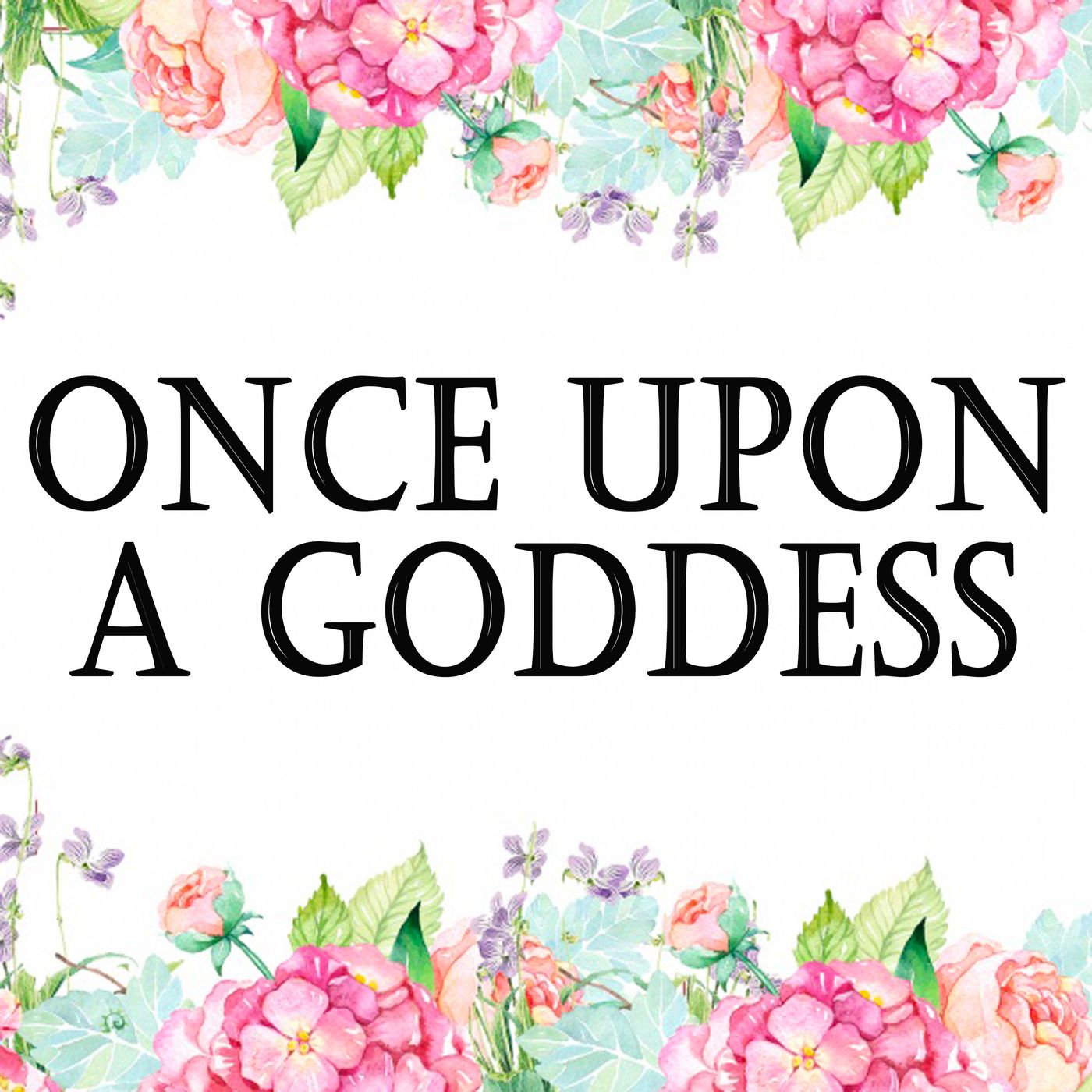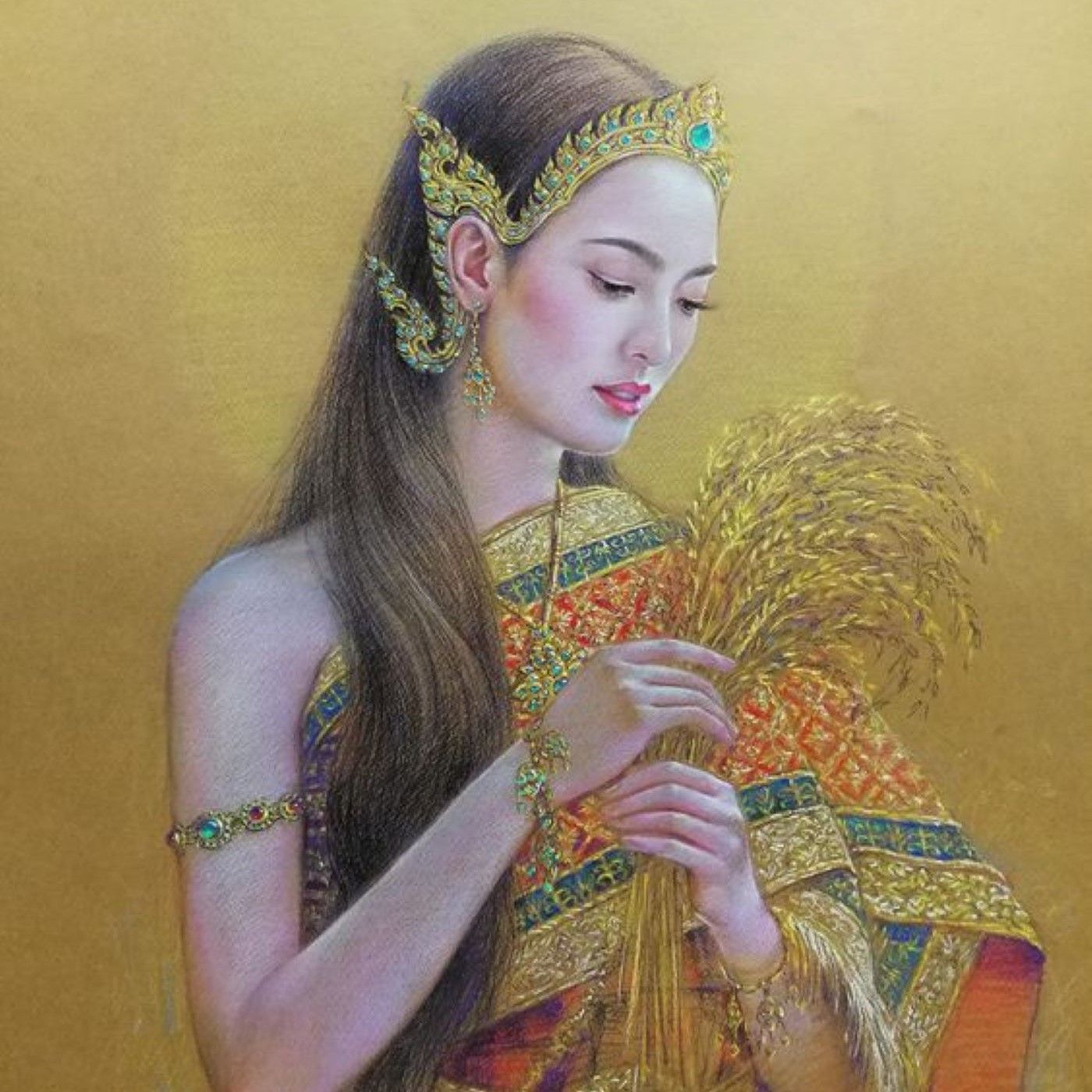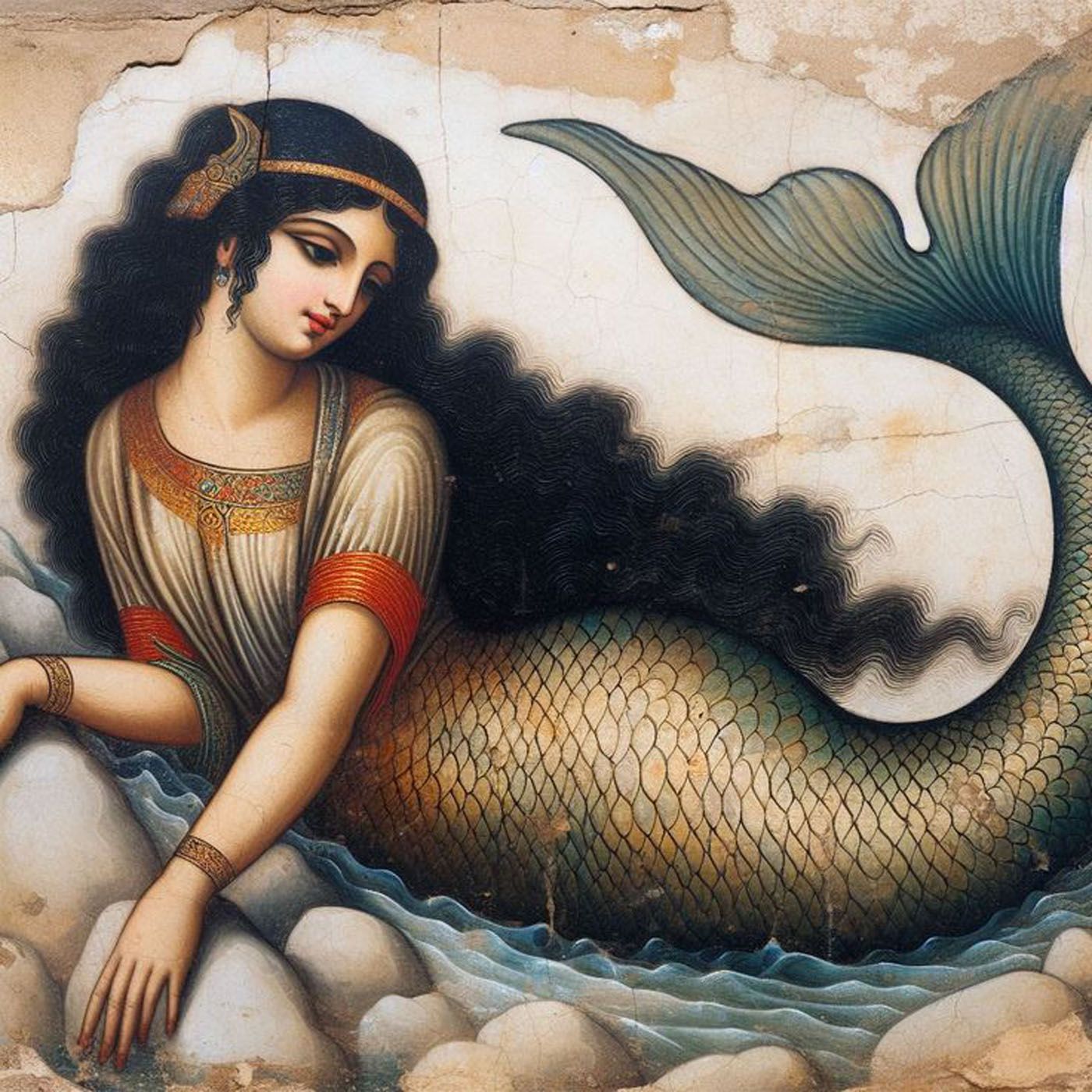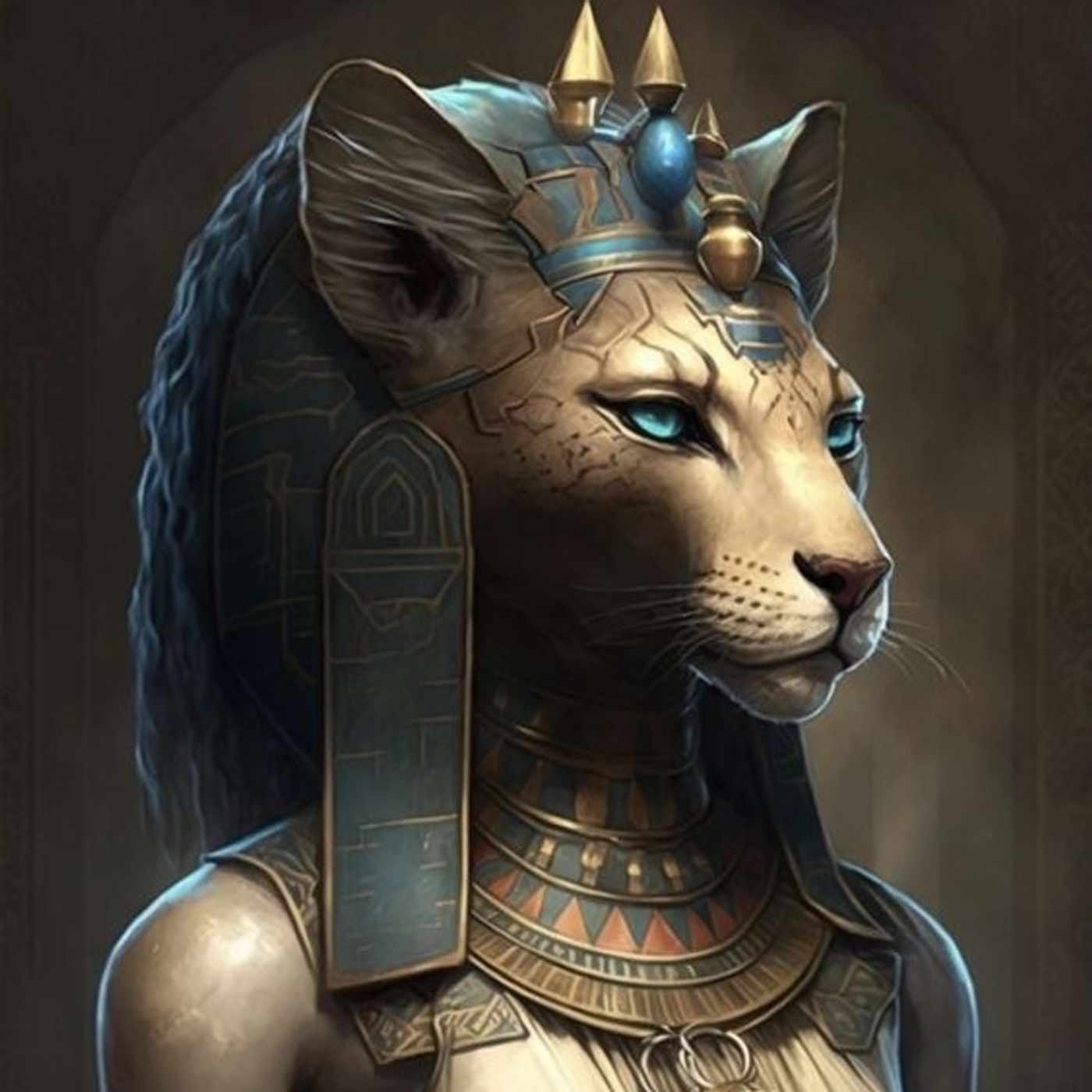Show Notes
Dewi Sri is not your usual goddess of grain and harvest. Born as a gift to the King of the Gods, her beauty becomes seen as a liability. Dewi Sri embraces her own power to transcend her trauma and transform her physical body into a bounty of earthly treasures for mankind. Her greatest of these will be the padi, or rice plant.Show Transcript
Dewi Sri – The Rice Goddess
Her story beings in the ancient lands of Java, within the islands now known as Indonesia.
The highest god of them all, Batara Guru sent out a decree to all the gods and goddesses within his rule. He desired a new palace and every one of them would be needed for its creation. If any of them failed to contribute or did not work to the best of their ability, then they would receive the harshest of punishments- he would take their head.
Antaboga shuddered when he heard the announcement. For he was a Naga, a serpent god, and without arms or legs he could not see how he could possibly help with the construction.
Fraught with worry he sought out the Lord Guru’s brother, Batara Narada for advice. Narada was just as perplexed as Antaboga and simply shrugged his shoulders. Antaboga was now overcome with hopelessness and began to cry.
Three tears fell from his eyes and as they landed upon the ground they took the form of eggs, with such a lustre that one might even think them to be pearls or jewels.
“There is your answer!” said Narada. “Take these to my brother and offer them as compensation for your inability to help.”
Antaboga took a deep breath of relief that there was a possibility for keeping his head. He gathered up the eggs in his mouth and made his way to see the Lord Guru.
The serpent was making good speed and had covered some distance when Garuda, the eagle god, landed before him.
“Good day,” said the eagle. “Where are you headed?”
But Antaboga would not answer as he was too scared to open his mouth and drop the eggs.
Once again Garuda spoke, now with agitation.
“Did you not hear my words clearly? Where are you headed?”
Once more Antaboga remained silent, and the eagle became angry.
“Do you think I am too lowly to speak to? Are you so arrogant that you cannot converse with an eagle?”
Antaboga’s lips did not move, and this continued silence fired Garuda’s rage. It now struck out at the serpent with its claws, puncturing Antaboga’s skin and making him cry out in pain.
With this, two of his precious eggs fell from his mouth.
They hit the ground and broke open. From each one emerged a wild boar, who squealed and ran from the scene, thankfully also scaring the eagle enough to make it leave also.
Antaboga was once more alone with one single egg still in his mouth. He tightened his lips together, determined not to have any harm come to this last treasure and continued on his way to Batara Guru.
The grand God welcomed the serpent, curious as to why he was visiting. Antaboga placed the precious egg at Batara Guru’s feet and then began to apologise that his serpent body would never allow him to physically match his brother’s and sister’s contributions to the new palace.
“Will you accept this gift from me instead?” Antaboga begged.
Batara Guru was taken by the Naga’s humility and dedication. More so, he was enthralled with the lustrous egg at his feet. He accepted the offering with much fervour and gratitude. The king of the gods then added -
“However, there is one more thing you must do. I ask of you to nest this until it hatches, then return what is birthed to me.”
Antaboga could only agree and returned home with his egg.
The snake settled it within his nest and curled over it as though his very life depended on it; which it did! He barely left it but for his own sustenance in order to continue his duty. After some time his dedication and diligence was rewarded and the egg began to hatch.
From within emerged the most precious and perfect infant girl and just as he had promised, Antaboga delivered her to Batara Guru and his wife. There she would be raised within the newly built palace as their own daughter….and a princess known as Nyai Pohaci.
Nyai Pohaci was beautiful and grew more striking as each day passed. When she reached womanhood, no one could look at her without being captivated by her loveliness. Unfortunately, this also included the King. Her father became so enamoured by her magnificence that he began to speak of taking her as his wife.
This outraged and deeply concerned the other gods. For even though Nyai Pohaci was Batara Guru’s adopted daughter, this would still break the taboo of incest. They all feared that for such a deep sin to be committed by the supreme god, then the very foundations of harmony and balance would be thrown asunder.
So it was that the Gods gathered to find a solution. Though it pained them to do so, it was decided that they would kill Nyai Pohaci, thus removing the temptation to the King. This they did by poison; with the intent it would be as gentle as possible. Nyai Pohaci fell into the deepest slumber and then her breath stopped. Her life now ended she was carried far away where Batara Guru could not find her.
What the gods had forgotten though was that Nyai Pohaci was not just a Princess. Born of a God and raised by another God, she was indeed a Goddess in her own right. Though they may have killed her physical body, her divine soul was still alive and conscious. Set free from the boundaries of her vessel, Nyai Pohaci was now reborn as Dewi Sri.
Dewi Sri thanked her brothers and sisters for liberating her spirit from the constraints of her physical beauty as well as her royal life with all its expectations. However, they had returned to their distant lives and did not hear her. The Goddess now turned her attention to the body they had left buried within the soil.
She did not cry for its demise but saw the blessings that it could now unfurl as it rotted and returned to its essence within the ground. So, as it fed the bugs and worms within the soil, Dewi Sri asked it also give sustenance to those above the surface. This it did in the most magnificent way.
From where her head lay emerged the coconut tree providing shade and its fruit that would become core to Indonesian cuisine.
From her nose, lips and ears emerged the plants that would give spices and vegetables to expand cooking and give richness to meals.
From her hair sprang gentle grasses and wildflowers, reminders of her flowing locks and their beauty.
From her breasts, that should have given sustenance to her children, grew trees bearing delicious fruits- bananas, mangos, papaya, durian and so many more.
From her hands and arms arose two groves of Teak trees; their wood infused with oils to resist pests making it perfect for building furniture.
From her genitals surfaced the sugar palm with its sweetness to bring delight to life.
From her thighs appeared more greenery in the form of bamboo; presenting to the earth its many gifts, from its strength in construction through to the delicate musical instruments it became part of.
From below the bamboo, where her shins lay evolved the satisfying tubers of taro and yams.
While it seemed her body had now gifted to the world all that it could, it now produced one more offering that would be her greatest.
From over her womb emerged the Padi; the plant that would give us rice, the foundation for meals and therefore the staple sustenance of her people.
With this final gift’s appearance, Dewi Sri’s body was truly released from its royal life and the trauma of her death. The plants that had emerged were free to continue with the grandness in which they had been called forth.
However, her story does not quite finish here.
Dewi Sri’s story began with the creation of the THREE eggs from the tears of Antaboga. When the other two eggs fell from his mouth and broke, from them emerged the wild boars, Kalabuat and Badug Basu: Dewi Sri’s brothers.
Born from the chaos of Garuda’s attack upon the serpent God, their lives had continued with this energy. Though their sister had always remained elusive to them, hidden within the palace and living her grand life, they had heard of her death and now wanted to seek out her grave.
They eventually found her body’s resting place. Upon seeing the splendour that had emerged from it they were overcome with wave upon wave of jealously; that their sister had been capable of all this while their lives had been filled with mess and bedlam.
Even though their sister called to them to appease such feelings, their rage blocked her love. Instead in a fit, the boars rampaged in circles around the grave until they collapsed and in turn perished also.
Dewi Sri prayed for their souls that they might turn their own tragedy into some wonder such as she had. However, before the intention could leave her spirit, Gumarang, the demon buffalo emerged and stole the bodies of the boars away. Thus, ensuring that even after death their souls would be bound to the energies of disarray and evil.
Gumarang too had seen the abundance and beauty of plants that had sprung from Dewi Sri’s body and was experiencing his own annoyance at her talents. In particular was the wonder of the Padi, as the buffalo knew just how important it was. Gumarang smiled deviously now as he realised he had with him the perfect way to undermine this vital gift. How perfect it would be if Dewi Sri’s brothers were the very basis of all things that could destroy these plants and undermine their life-giving properties.
The cunning buffalo demon took the two bodies of the boars and, just as their sister had given rise to so many plants, now her brothers would be the source of endless pestilence. From their bodies emerged even more boars along with pigs, rats and countless insects; all the creatures that could destroy rice fields, robbing the people of this essential food source.
Gumarang’s plan would have worked perfectly. However, the Gods and Goddesses soon saw how Dewi Sri’s beautiful gift was being destroyed by wave after wave of attack.
Sulanjara, one of Dewi Sri’s royal brothers, gathered his remaining sisters and together they sought out Gumarang to punish him.
Though the demon buffalo wished to fight the siblings and claim his victory. He soon knew he was no match for their strength, nor their determination to overcome him. Gumarang collapsed upon the ground and begged for his life.
Sulanjara demanded that the buffalo recall the pestilence he had unleashed but they all knew this was not possible. Sulanjara lifted his sword for one final deadly blow upon Gumarang when the buffalo offered his life in another way. He would spend the reminder of his days tending to the rice fields, helping the farmers and protecting the plants. Sulanjara agreed and sheathed his sword. Thus beginning the wonderful work of the buffalo in rice farming.
The souls of Kalabuat and Badug Basu would persist though through the pests that put rice fields at peril. So too the soul of their creator Dewi Sri watches over and protects her precious plants.
So it is that to this day, within the rice fields of Indonesia, farmers place shrines to Dewi Sri; to call upon her to protect their fields and bless them with bountiful crops as well as thanking her for her wonderful gift.



